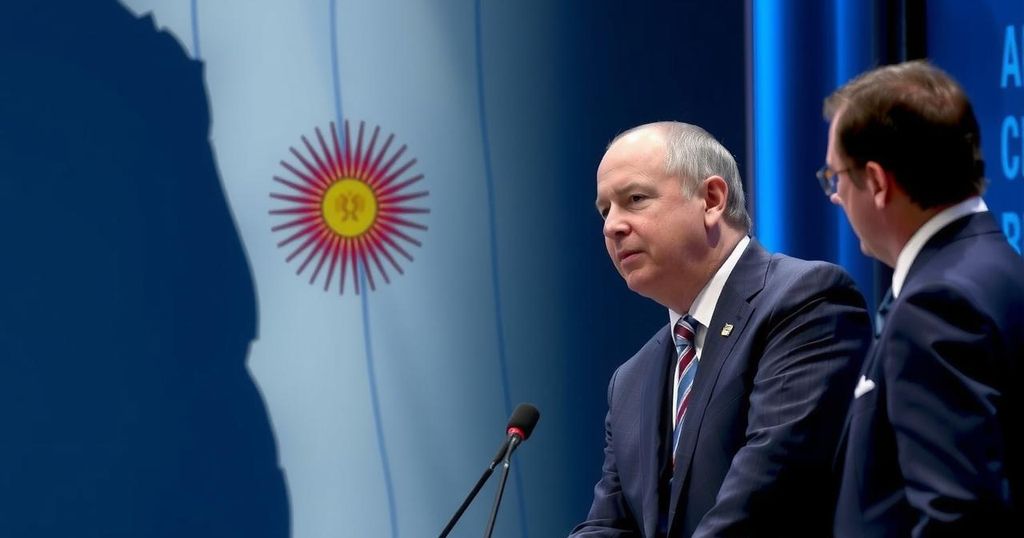Global news
ANA LAMAS, ANTONIO GUTERRES, ARGENTINA, ASIA, AZERBAIJAN, BAKU, CLIMATICA, COUP, ENVIRONMENT MINISTRY, EUROPE, EUROPEAN UNION, FRANCE, GUARDIAN, INTERNATIONAL RELATIONS, LAMAS, MILEI, MILITARY COUP, MINISTRY OF FOREIGN AFFAIRS, PARIS, REGIONAL COOPERATION, SOUTH AMERICA, UN, US, WEST AFRICA
Leila Ramsay
0 Comments
Argentina Withdraws from Cop29 Summit, Raising Alarm Over Climate Policy Stability
Argentina’s withdrawal from Cop29 elevates concerns about the Paris Agreement’s stability under President Milei, a climate crisis denier. The decision, confirmed by environmental undersecretary Ana Lamas, undermines the nation’s role in global climate finance discussions and raises questions about future international commitments, particularly with shifts in U.S. leadership and trade negotiations.
Argentina has withdrawn its negotiators from the Cop29 summit in Baku, Azerbaijan, after only three days of participation. This decision raises serious apprehensions regarding the stability of global climate agreements, particularly the Paris Agreement. The move comes under the leadership of Javier Milei, who has previously dismissed the climate crisis as a “socialist lie” and has indicated reluctance towards international climate commitments. Ana Lamas, the undersecretary for the environment, confirmed that representatives from the Milei government would no longer attend the summit, although she clarified that this step does not indicate an intention to exit the Paris Agreement altogether. The withdrawal occurs amidst broader concerns over climate policy, especially following recent elections in the United States, where Donald Trump has signaled intentions to withdraw from the Paris Agreement again. Lamas stated, “It’s true. We have instructions from the ministry of foreign affairs to no longer participate.” Experts argue that Argentina’s departure from the Cop29 talks undermines the country’s voice in climate finance negotiations at a critical time. Carla Chavarria, a climate change management specialist, expressed disappointment, pointing out that this decision could hinder Argentina’s resources to combat climate change. This withdrawal also signals an ideological shift under Milei’s administration, which has actively sought to rollback environmental protections in favor of economic growth. Scholars like Julieta Zelicovich warn that such a stance could jeopardize trade agreements between Argentina and the European Union, stressing that without environmental commitments, these negotiations would falter. Oscar Soria from the Common Initiative thinktank criticized the Milei government for its ideological decisions that detrimentally affect Argentina’s interests, noting, “This decision is purely ideological and goes against the best interest of the country.” In summary, Argentina’s sudden withdrawal from Cop29 illustrates a significant departure from prior climate policies, raising concerns for both national and international climate action efforts and further destabilizing global agreements focused on combating climate change.
The backdrop of Argentina’s current climate policy is rooted in the recent election of Javier Milei, whose administration has publicly questioned the reality of climate change. Historically, Argentina has participated in global climate summits, actively engaging in discussions aimed at addressing issues related to climate finance and environmental sustainability. However, with Milei at the helm, there is a palpable shift towards prioritizing economic growth over environmental commitments, a stance that correlates with his previous statements regarding the climate crisis. The implications of such a policy shift resonate within international negotiations and indicate a potential shift in Argentina’s role in global climate initiatives.
Argentina’s withdrawal from the Cop29 summit reflects a broader trend of rejection of established climate agreements under the current administration. This decision not only diminishes Argentina’s influence in vital climate negotiations but also poses a risk to its economic future as the nation seeks to address climate impacts. The sentiments echoed by environmental specialists highlight the concern that such actions could isolate the country not only from international support for climate resilience but also from potential economic benefits tied to climate commitments and agreements.
Original Source: www.theguardian.com




Post Comment